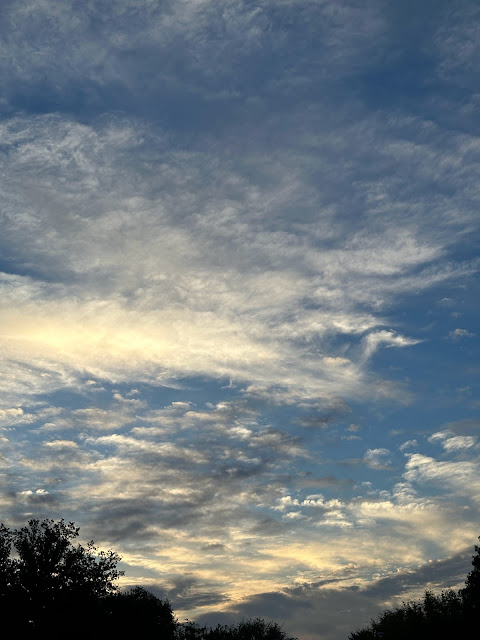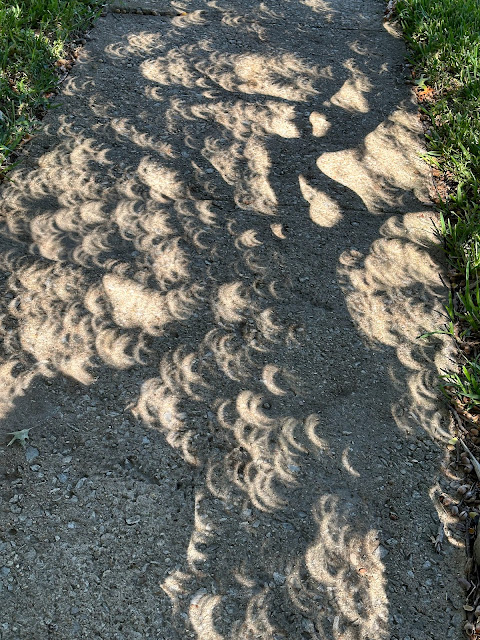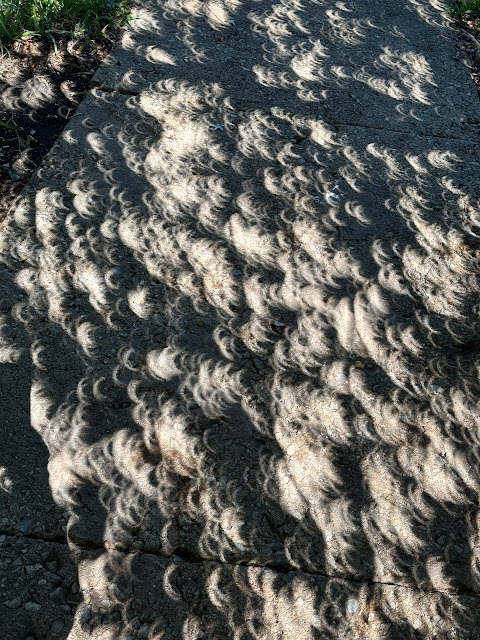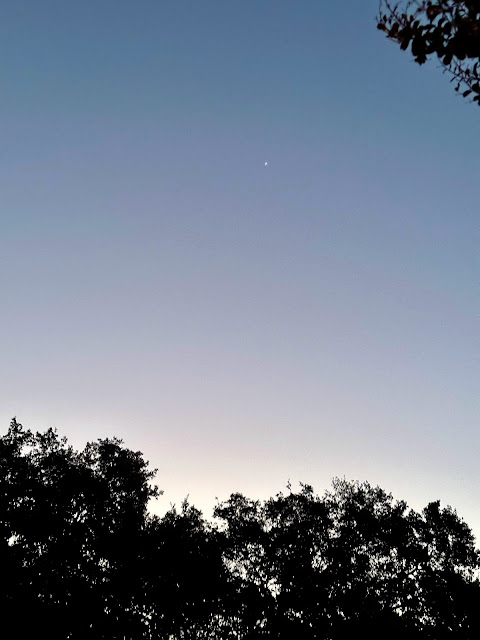To listen in your browser, click here.
Teach me your way, Lord;
lead me in a straight path because of my oppressors.
Do not turn me over to the desire of my foes,
for false witnesses rise up against me,
spouting malicious accusations.
I remain confident of this:
I will see the goodness of the Lord
in the land of the living.
Wait for the Lord;
be strong and take heart
and wait for the Lord."
Psalm 27:11-14 NIV
Imagine this: you are besieged by wicked enemies and foes; an army has you surrounded; false witnesses are spreading lies about you; you are on the run, hunted by people who want only to do you harm.
What would your first response be in that situation? If you are a Christian, I hope it would be to pray.
What kind of prayer would rise first from your heart and lips? For me, it might only be the name of Jesus. Or maybe, "Lord, help!" Or perhaps, "Lord, have mercy!"
David is in exactly that situation in Psalm 27. Returning to the beginning, we see references to his desperate circumstances all the way through. But his first-response prayer looks quite different from mine. He begins by proclaiming his confidence in God and seeking Him above all things.
Context
This is the fifth essay in our series reflecting on Psalm 27. In this Psalm, God through David has given us a prayer-song for when we are afraid of the dark: whatever kind of dark, whether literal darkness or emotional and spiritual darkness. David seeks shelter in God's personal presence with confidence borne out of His past rescues, and so can we.
In the first post, we consider the themes and structure of the prayer as a whole. In the second post, we see how David describes his experience of God's saving defense (1-3). In the third post (4-6), David expresses his expectant desire for God's sheltering presence, his "one thing": to dwell with and behold his God. In the previous post, we see David shift from talking about God to talking to God directly (7-10). He pleads for the Lord's favor and fellowship, and by the end of the section he has found solace in the assurance that the Lord will receive him, no matter what the people around him might do.
In this fourth section (11-13), David continues to plead to God directly, this time for God's protection and direction. As we begin to wrap up the Psalm, he finally arrives where I might have begun.
Call
After proclaiming God's praise, pursuing His fellowship, and praying for His presence, David now calls out or pleads for help with the immediate earthly problems.
· David seeks direction.
"Teach me your way, Lord;
Lead me in a straight path…" (11).
· David seeks deliverance.
"Do not turn me over to the desire of my foes" (12).
· David implies he wants vindication.
"…for false witnesses rise up against me, spouting malicious accusations" (12b).
And that is the extent of his practical requests. Pretty simple, given the fraught circumstances.
Confidence
From those brief prayers, David concludes the section, as with the previous three sections, with a statement of confidence in God:
"I remain confident of this:
I will see the goodness of the LORD
In the land of the living" (13).
David remains confident. The confidence he had at the beginning of the prayer has not left him. He remains confident. He is convinced that God can do what He promises. He is convinced that he will see the LORD's goodness, benevolence, and favor, that the LORD—no matter what comes—will not mistreat him. Finally, he remains confident of this goodness "in the land of the living."
My default interpretation of that final line of the section was that David was speaking spiritually. I assumed that he was referring to the afterlife, that he could stay confident because he knew that even if the worst happened with the present enemies, he would be in heaven with God, so all would be well.
And I was wrong.
Those ideas weren't wrong, in and of themselves. But they were the wrong interpretation here, in this small swatch of a whole prayer-poem.
Why do I say that?
That musical lyric, "in the land of the living," which we have heard and sung so many times, is not unique to this Psalm. There are a number of idioms or "stock phrases" which appear unchanged or nearly unchanged across the Old Testament. This phrase is one of those, and in several of the other occurrences, it clearly means, "on earth," in this roller coaster of a journey from conception to the grave.
Consider these examples:
· "For you have delivered my soul from death, my eyes from tears, my feet from stumbling; I will walk before the Lord in the land of the living" (Psalm 116:8-9 ESV).
There death is contrasted with walking in the land of the living.
· "But God will break you down forever; he will snatch and tear you from your tent; he will uproot you from the land of the living. Selah" (Psalm 52:5 ESV).
Here death is described as being uprooted from the land of the living.
· "I said, I shall not see the Lord, the Lord in the land of the living; I shall look on man no more among the inhabitants of the world" (Isaiah 38:11 ESV).
Here again, physical death—no longer looking upon the inhabitants of the world—is the end of life in the land of the living.
· "By oppression and judgment he was taken away; and as for his generation, who considered that he was cut off out of the land of the living, stricken for the transgression of my people?" (Isaiah 53:8 ESV).
This predicts the substitutionary death of Messiah, fulfilled in Jesus. At the cross as He breathed His last, he was "cut off out of the land of the living."
· "Assyria is there, and all her company, its graves all around it, all of them slain, fallen by the sword, whose graves are set in the uttermost parts of the pit; and her company is all around her grave, all of them slain, fallen by the sword, who spread terror in the land of the living" (Ezekiel 32:22-23 ESV).
The slain enemies of Israel used to spread terror in the land of the living and died as a consequence.
· "But I was like a gentle lamb led to the slaughter. I did not know it was against me they devised schemes, saying, 'Let us destroy the tree with its fruit, let us cut him off from the land of the living, that his name be remembered no more.'" (Jeremiah 11:19 ESV).
One more time, the land of the living is a metaphor for the physical, earthly life.
Why did I spend so much time on that point? So that you can see what I saw without simply taking my word for it, because this idea proves important in understanding and applying the Psalm as a whole.
If "the land of the living" is David's earthly life and not the afterlife, but he is currently hunted, falsely accused, and surrounded by mortal enemies, how is he so sure that he will see the goodness of God right here and right now? One might suggest that he is confident because God always gives us what we ask if we have enough faith. Without belaboring that point at present, I will say that the rest of Scripture contradicts that interpretation. If you disagree, perhaps we can discuss it another time.
The other alternative, which I believe is correct, seamlessly connects to the rest of this prayer. What is David's deepest core desire in all of life? To dwell with his God.
"One thing I ask from the Lord, this only do I seek: that I may dwell in the house of the Lord all the days of my life, to gaze on the beauty of the Lord and to seek him in his temple."
Psalm 27:4 NIV
What, consequently, is David's deepest fear? David's deepest fear is not military defeat or death; it is to lose God's presence, for God to turn away from him in anger.
"One thing I ask from the Lord, this only do I seek: that I may dwell in the house of the Lord all the days of my life, to gaze on the beauty of the Lord and to seek him in his temple. My heart says of you, "Seek his face!" Your face, Lord, I will seek. Do not hide your face from me, do not turn your servant away in anger; you have been my helper. Do not reject me or forsake me, God my Savior."
Psalm 27:4, 8-9 NIV
David has assured himself in the previous sections of this prayer that his greatest desire will be given and his greatest fear will not come to pass. Knowing this, knowing that—no matter what—he will go through it in the companionship of God, he remains confident. We might almost say that this foreshadows Paul's statement in Philippians 3 that knowing Christ in the power of His resurrection and the fellowship of His suffering was his "one thing." Or that it hints at Romans 8:28, when we read that God causes all things to cooperate for the good of those who love Him…and that "good" is conformity to the image of Christ.
Are you encompassed by fears, surrounded by danger, ensnared by troubles? Are the waves much, much too high and threatening to drown you? Is your child far from the Lord? Your marriage imploding and taking the children with it? Mental illness rendering a precious someone unrecognizable? Caregiving or chronic illness wearing you so thin you feel you must rip apart? A dreadful diagnosis quenching your hope and confounding your doctors? The money running out with no clear replenishment in sight? Society turning its back on you and leaving you behind for reasons beyond your control? Healthcare desperately needed but beyond your reach? Your dearest loved one fading away like a rainbow in the sun?
These are all real situations facing people I know right now. Or my own family. I do not say this glibly or intend to minimize the pain. Even into those real and great adversities, I must ask this.
What is your one thing, beloved? What do you fear most and desire most? (The fear points toward the desire.)
If you, like David, most desire communion with God and most fear losing the sunshine of His face, then seek His will and lean into the confidence that you will see His goodness, even here, even now. If you walk through suffering, it will be in fellowship with the suffering Christ; if you walk in resurrection joy and fruitfulness, it will be in the power of the risen Christ. His promises will never fail. He will never, never, never, never leave or forsake His children (Hebrews 13:5).
If you recognize that is not your deepest desire and greatest fear, go to Him and ask. Tell Him what you desire more than His presence, confess your fears, and tell Him that you want to want Him more than anything or anyone, but you don't know how. He will hear and answer your cry without shame or condemnation. And He knows anyway.
What is more, having given us Himself, would He ever refuse us the lesser gifts of wisdom to walk with Him, help against our foes, or any good thing in the land of the living? We can trust Him. We can place our confidence in Him. He is faithful.
Courage in the Lord
In the final short section (v. 14), David counsels his own heart to trust the Lord:
Wait for the Lord;
Be strong and take heart [or courage]
And wait for the Lord.
Psalm 27:14 NIV
We can know that he is talking to himself here because in the Hebrew, the commands are singular: one "you," not "y'all." David is following the counsel D. Martyn Lloyd-Jones would later give of talking to himself more than he listens to himself.
He is, after all, surrounded by enemies.
Even though his confidence, rescue, and light are in the Lord his God, it is a three o'clock in the morning in his soul, so he needs to keep reminding himself of what is true.
He tells himself to wait for, hope in, or expect the Lord. God's promises are "yes and amen," not "maybe, we'll see." We can expect Him to do what He says He will do.
He talks himself into strength and courage, which he can find because the Lord is his light, salvation, and fortress, leaving no reason to fear (verse 1). He can find strength of heart because he dwells with the God he loves and knows that God will not forsake him.
And he repeats for emphasis that his soul should expect the Lord.
As short as this section is, it offers an important reminder for our own souls' three o'clocks: wait. In overwhelming darkness and difficulty, we do very much need courage to wait. We need courage and strength to believe the sun will rise again and three o'clock will not last forever. We need patience to endure with the expectation that God is faithful and we will see His goodness even now, in the land of the living.
In those seasons, the presence of God is the light (maybe the only light) in our darkness. He is the strong, trustworthy person we need in the nightmares. For the Christian, the triune infinite-personal God dwells not only with us but in us, and we are in Him by grace through faith in Christ. The comfort, courage, strength, and peace we need are in our very hearts.
He can sustain us and even give us joy and peace in the three o'clocks of our souls' dark nights.
Courage, dear hearts.
Closing prayer:
Lord of peace and power,
Who gave Abraham confidence to obey
Even to the sacrifice of his son, his only son,
Isaac, whom he loved;
Who named Gideon a "mighty warrior"
When he was still hiding in the wine press threshing wheat;
Who gave confidence to David the shepherd boy
To face the giant Goliath without sword or armor,
Only a handful of stones, a sling, and You:
We come to You today
Overwhelmed with the darkness and distress
Of what Your providence has given us,
Needing stores of courage we don't have
And light we can't see.
Come to us quickly, Lord;
Be the lantern in our dark nights
And the mighty champion who drives away our dread and despair;
Hold us close to Yourself and strengthen our hearts
With Your love and promises.
Grant us audacious faith to live in confidence
Of Your goodness in the land of the living,
For You are good and do good, today and in the life to come.
We ask this in the name of Jesus the true Light of true light,
Very God of very God.
Amen.
If you are reading in your browser and would like to subscribe by email, click here:
http://eepurl.com/hCJ9Z1






